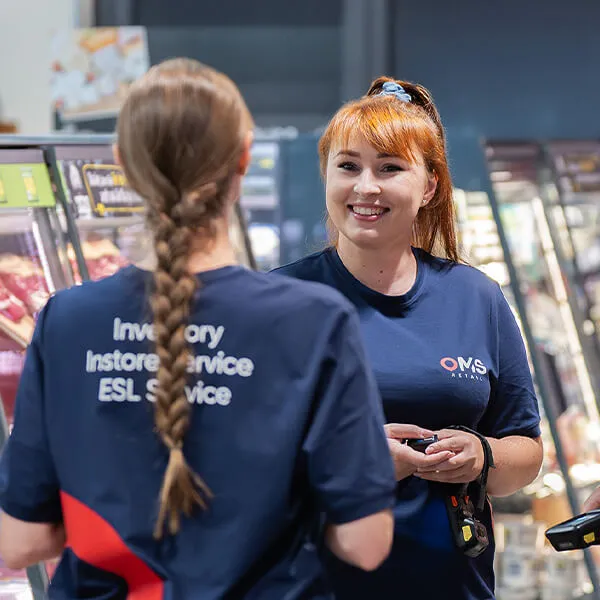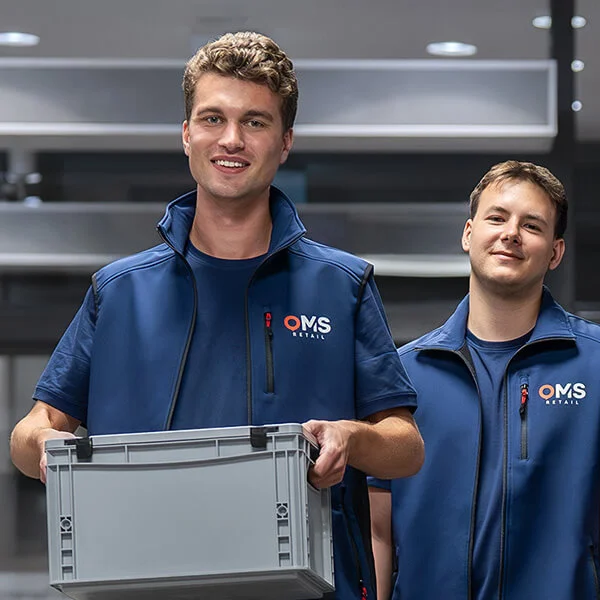Types of Stocktaking – An Overview
Different types of stocktaking present companies with varying operational and organisational requirements. As an experienced full-service partner, OMS Retail supports retailers across all recognised stocktaking methods – from traditional physical stocktaking on the reporting date to postponed procedures and structured sampling approaches.
With over 20 years of experience, modern technology and more than 900 employees during peak season, we ensure structured inventory stocktaking, reliable results and a measurable reduction in the workload of your internal teams throughout Europe.

1. importance of a proper inventory
Proper stocktaking is essential for retailers and fulfills several key functions:
- Legal obligation & balance sheet security: basis for reliable annual financial statements.
- Loss prevention: Shrinkage, theft and errors become visible.
- Data quality for merchandise management: Accurate inventories ensure planning and scheduling.
- Smooth processes & trust: Disruptions are minimized, trust is strengthened.
This makes stocktaking an important tool that creates legal certainty, reduces losses and lays the foundation for successful business decisions.

Our full-service approach covers all common inventory types. This enables us to provide the optimum inventory solution for every retail model, simplify processes and significantly reduce the workload on your team.
2. overview of the inventory types
Various inventory types are permitted under commercial law. The most important of these are the physical inventory as at the balance sheet date, the time-based inventory and the inventory sampling. While all inventory types fulfill specific requirements, in the retail trade, it is primarily the closing date and postponed inventories that are used:
Difference between a physical inventory and a permanent inventory
Both types of stocktaking are recognized by law - however, the key date stocktaking impresses with its accuracy, clear processes and simple planning. While the perpetual inventory relies on continuous data collection, the physical inventory on the reporting date provides reliable results and maximum transparency for the annual financial statements. OMS Retail provides you with efficient and legally compliant support.

3. advantages of an inventory service provider
Stocktaking in the retail sector involves considerable organizational and personnel effort. It requires precise planning, a large number of employees and clear coordination, especially for key date inventories or complex store structures. If the process is handled exclusively internally, the risk of overload, errors and incomplete inventories increases.
Working with a specialized service provider such as OMS Retail significantly reduces this effort. External inventory teams work according to tried-and-tested standards, bring the necessary technology with them and guarantee legally compliant and audit-proof implementation. This gives you reliable results without tying up too much of your own staff.
4. four steps to a successful inventory
A structured process ensures that your inventory is carried out efficiently and without errors. At OMS Retail, a central team supports you from the initial inquiry through to completion. The typical project process is divided into four steps:

5. frequently asked questions about inventories
When exactly do I have to carry out an inventory as a retailer? How can I find the best time and how long does the count usually take? Can my store remain open during the inventory count - and what does inventory sampling actually mean? In our FAQ, we provide answers to the most important questions about planning, procedures and legal requirements.
As a retailer, do I have to carry out an inventory every year?
In principle, yes. In Germany, Section 240 HGB stipulates that every merchant must take stock at the end of the financial year - usually on the balance sheet date of December 31. An inventory is also required when a company is founded, sold or dissolved.
Exceptions only apply to very small companies: Sole traders who generate less than €600,000 in turnover and €60,000 in net profit in two consecutive years are exempt from the inventory requirement. However, most retailers exceed these thresholds, meaning that an annual inventory is part of proper accounting.
Incidentally, stocktaking is not only mandatory, but also useful to know the actual stock level - even if you are not legally required to do one, it is recommended for an operational overview.
When is the best time to take stock?
The optimum time for stocktaking depends on your business model. Traditionally, stocktaking is carried out at the end of the year, as this is when the accounts are closed. Many retailers set the date directly after Christmas or at the beginning of the year.
It is important that stock levels are as low and calm as possible at the time of the count - this speeds up the count. Seasonal retailers, for example, like to take stock after the peak season, when the warehouse is emptier. Thanks to the postponed inventory in accordance with Section 241 HGB, you can also count a few weeks or months before or after the cut-off date.
The ideal date is one that causes little disruption to business operations: for example, on a Sunday, on a day off or in the evening/night outside opening hours. Then you don't have to close the store and customer traffic doesn't interfere with the count.
In short: Plan the stocktake for a period of low sales and coordinate the date internally and with your service provider well in advance.
How long does an inventory usually take?
The duration of an inventory depends on the size of the sales area or storage area and the number of items. In a small store, the count can be completed in 2-3 hours, while a large supermarket may need several hours or even a full working day.
With the support of a professional stocktaking team, the duration can be significantly reduced - experienced stocktakers often manage to count an entire store within a few hours. Preparation is important: if the goods are properly sorted and labeled, the process is faster.
The methodology also plays a role: the counting time is reduced with an inventory sampling (if permitted), while a full inventory naturally takes longer. An inventory service provider such as OMS Retail can usually estimate quite accurately in advance how much time an inventory project will take.
As a general rule, it is better to plan a little buffer in case unplanned rework is necessary and start early in the day so that you can finish by the evening if necessary.
Can I keep my store open during the inventory?
This depends on the type of inventory and the organization. Many retailers close their store for the duration of the stocktake (e.g. half a day) so that the count can be carried out undisturbed. This is particularly common in the case of a key date inventory in order to record all items in a short period of time.
Theoretically, it is also possible to count during ongoing operations - for example, by blocking off area by area - but this involves risks: customers could move or buy goods while the count is in progress, leading to confusion. It is more practical to carry out stocktaking outside of opening hours.
OMS Retail offers maximum flexibility here: we can count at night, early in the morning or at weekends if required, so that your day-to-day business is not affected. In some cases (e.g. 24-hour supermarkets), a complete closure cannot be arranged; in this case, stocktaking can be carried out in sections, with individual aisles temporarily closed to customers.
Overall, the recommendation is: if possible, carry out the process without customer traffic in order to achieve a clean and quick result.
Under what conditions is an inventory sampling permitted?
Inventory sampling is a special type of inventory in which only part of the stock is counted and the total stock is estimated from this. It is permitted by law in Germany (Section 241 (1) HGB), but is subject to strict conditions.
To be allowed to use inventory sampling, your stock records must be kept very properly and you must use a recognized mathematical-statistical method. In addition, the result must be as accurate as a full inventory with a 95% probability.
In practical terms, this means that the method is particularly suitable for large warehouses with many similar items. For a normal retailer, the statistical effort would usually be too high. Before you carry out a random sample, you should always consult your auditor or tax advisor.
In many cases, auditors require at least random recounts to check plausibility despite inventory sampling. In short: Yes, inventory sampling is permissible and saves time, but it requires expert knowledge and clear documentation in order to be recognized.
For this reason, most retailers - especially in the SME sector - continue to rely on the full inventory (as of the reporting date or relocated) to be on the safe side.
Stocktaking is not only a legal obligation for retailers, but also an important tool for transparency and planning security. The timing, duration and procedure can be optimized with good preparation.
If you would like support with your stocktaking, we will provide you with professional support from planning to implementation.
6th OMS Retail: Your partner for audit-proof inventories
Proper stocktaking is essential for retailers - it creates legal certainty, transparency and a reliable basis for business decisions. Incorrect or incomplete inventories, on the other hand, entail tax and legal risks.
As a full-service provider, OMS Retail supports you with all recognized inventory types: from the classic inventory as of the reporting date, to the time-delayed inventory, to inventory sampling. With over 20 years of experience, modern technology and a team of experts operating throughout Europe, we guarantee structured processes, precise results and audit-proof documentation.
This ensures compliance with all legal requirements and relieves your internal resources at the same time.
Do not hesitate to contact us
Book your full-service inventory now and gain a reliable partner who will take the pressure off you in the long term. Give us a call or use our contact form for a personalized offer and you and your store network will benefit from our full service for a fast and efficient inventory in the future.

Your direct contact to us!
E-Mail: info@oms-retail.com
Phone: +49 (0)511 / 515 283-0




